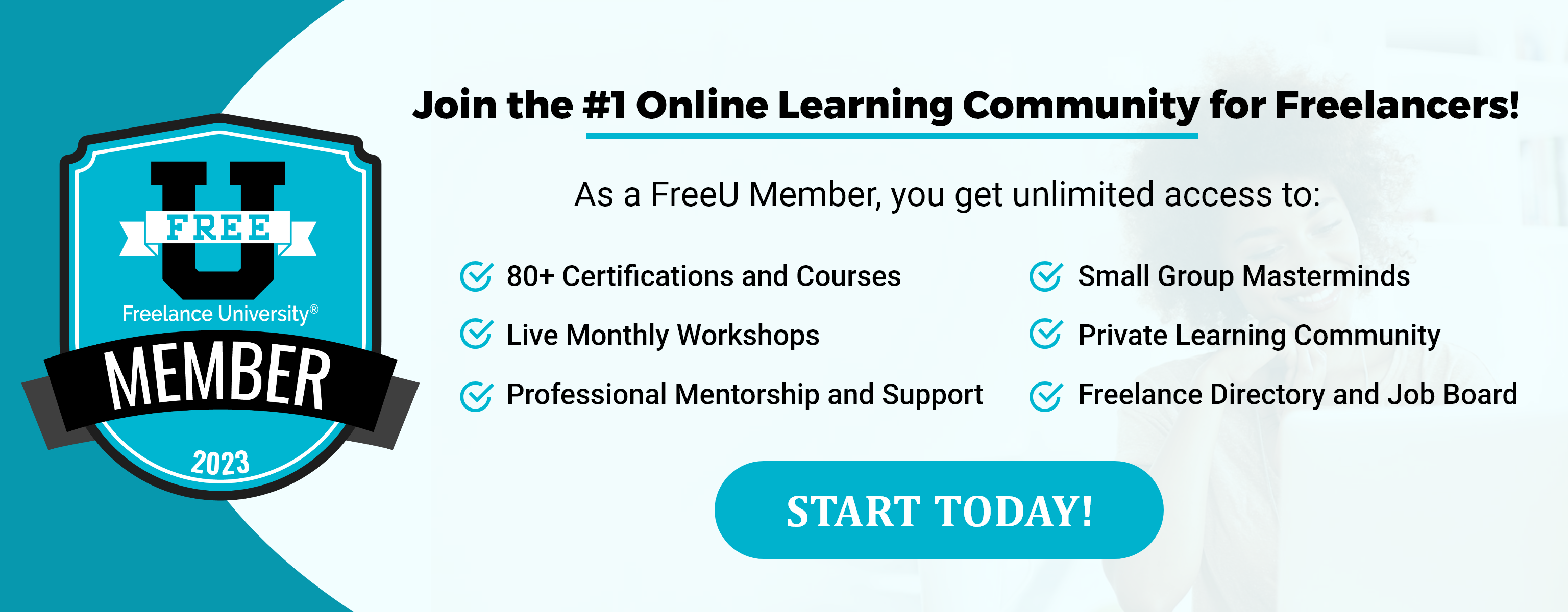Five Ways to Overcome Obstacles When Starting a Freelance Business
By Jena Kroeker

The most exciting part of starting a freelance business is the launch, right? Well, although some of you may agree, I’m sure others are feeling different emotions right now, especially if their businesses failed to launch the way they hoped.
Fear, anxiety, regret, shame — these are some of the reactions a failed launch can bring. But we’re all about grace, hope, and positivity here at FreeU. So, whatever has happened in the past with your business, acknowledge those feelings, set them aside, and let’s look to the future.
When Launches Fail
The word “launch” reminds us of rockets launching into outer space. And when we’re talking about freelance businesses, the analogy fits. For many of us, freelancing or virtual assistance is a journey into the unknown, full of adventure and risks, especially if we don’t come from an entrepreneurial background.
In space travel, launches are canceled for good reasons. For example, NASA’s Artemis 1 program, involving plans for a Moon-orbiting mission, had several launches scrubbed because of technical difficulties, a fuel supply leak, and even a hurricane.
Now, in contrast, let’s return to more earthly launches, namely, a 35-year-old named Tripp who still lives with his parents in the movie Failure to Launch. While sitting with two of his friends who also live with their parents, Tripp exclaims,
“I’m looking around this table, hombres, and I see three winners, huh? And to every one of those out there who sees something different, I say ‘bring it on,’ ’cause it’s gonna take a stick of dynamite to get me out of my parents’ house.”
As the movie progresses, we see Tripp’s parents go to great lengths to encourage him to move out and start a life of his own. And we discover deeper reasons why Tripp has chosen to stay with his parents. But the main point is that Tripp seems stuck, unable to move forward in his personal life. He’s missing out on additional freedoms the world has to offer.
That can happen with us too when it comes to starting our freelance businesses. Sometimes we encounter technical or environmental obstacles that cause a launch failure. Other times, we get stuck and need to work through a number of personal obstacles before we can enjoy the freedoms a freelance or virtual assistant business brings.
But never fear. In an article titled “How to Restart as an Entrepreneur After a Big Failure (or False Start),” Sean Ogle reassures us, “Every single entrepreneur has failures and setbacks – that’s how you learn what works and what doesn’t.”
With that in mind, let’s explore some common obstacles and how to overcome them.
Five Obstacles to Overcome When Starting a Freelance Business
1. Insufficient Planning
The Problem
You’re eager to launch your freelance business and decide to wing it. After all, it doesn’t look that hard, and how can you go wrong? You’ve got a fantastic business website, and you’re sure that writing blog posts for cats named Tigger is going to be a lucrative niche. Surely some cats named Tigger can read.
Alas, once you try to launch your business, you find there is very little demand for your services. Maybe you should have researched the niche and competition more thoroughly. And maybe you should have researched more about cat literacy (or the lack thereof). Similarly, when speaking to fellow freelancers, you discover they too failed to launch their businesses successfully because they didn’t spend enough time planning their overall goals and organizational structure.
The Solution
In her article, “7 Reasons Why People Fail at Launching a Virtual Assistant Business,” Tara Reid suggests, “Sometimes you might not prepare as much as you should have because you see all of the Instagram posts telling you how easy it is.” It’s true that we need to be careful not to base our expectations on what we see on social media posts, especially posts from more established freelancers and VAs.
Instead, you need to create a strong business plan like the one described by Allie Decker in an article titled “When is the Best Time to Start a Business? What Research & Experts Say.” She says,
“A strong business plan utilizes research on your competitors and target audience. It considers competitors’ offerings, pricing models, options, KPIs, delivery, timelines, customer feedback, marketing channels, and areas for growth. The goal is to understand where your industry is at, where it’s heading, and how you can set up your business to succeed in the space.”
Furthermore, you need to plan your “organizational health,” as FreeU co-founder and instructor Craig Cannings outlines in the “Self-Care for Freelancers” course. In particular, formulate strategies for the following elements before starting your freelance business:
• Business systems and processes (e.g. administration, client, marketing and content management systems)
• Time and schedule management
• Work/home life management
• Personal productivity
• Personal development.
This advance planning will prevent you from becoming overwhelmed as you prepare for a successful business launch.
2. Imposter Syndrome
The Problem
You have an impeccable business plan, and all systems are go. But your own thoughts are holding you back. You can’t stop thinking, “Who do I think I am? I’m not cut out to be a freelancer or VA.” You feel like an imposter in the freelance or virtual assistant industry, and every time you consider pressing the launch button, you hesitate.
This experience is described in Dr. Kyle Elliott’s article, “What Is Imposter Syndrome And How Can You Overcome It?”:
“Imposter syndrome refers to the inability to internalize your success. According to Dr. Lisa Orbé-Austin, a psychologist, executive coach and author of Own Your Greatness: Overcome Impostor Syndrome, Beat Self-Doubt, and Succeed in Life, imposter syndrome is the experience when you are skilled, accomplished, credentialed and experienced but you haven’t internalized it. As a result, you fear being exposed as a fraud for things like making mistakes or falling short, and to compensate for this, you either overwork or self-sabotage.”
The Solution
To combat imposter syndrome, you need to avoid the “comparison trap.” Sometimes these thoughts creep in because of your own insecurities, past experiences, or negative comments from others. Humans are complex creatures, with limitless possibilities. At the same time, however, we’re creatures who often feel most comfortable with predictable patterns and limits. Consequently, you might have heard others express surprise at your plans and interpret that as meaning you’re an “unlikely” candidate for a certain job, compared to other people. If you internalize negative comments, you might start to doubt yourself or think you don’t belong in your newly chosen field.
Above all, monitor your own self-talk to ensure it stays positive. In his article titled “What Are the Steps to Start a Freelancing Business?” Aaron Joseph Hall puts it this way:
“You must kill comparison before it has any chance of creeping in.
“Why? It causes you to focus on other people and miss what you’re doing.”
In addition, as we shared in a previous blog post, “How to Combat Imposter Syndrome in Your Freelance Business,” take these steps to build your confidence:
• List any training you’ve done including what skills you’ve added or updated.
• Make goals and congratulate yourself for being proactive.
• Surround yourself with experienced freelancers and virtual assistants who can encourage you and guide you.
• Connect with supportive peers or a mastermind group to share challenges and celebrate successes.
• Find a business mentor who can help you get unstuck.
3. Indecisiveness
The Problem
You keep tinkering with your website, stressing out about your business name and pricing structure. You’re trying to choose the ideal niche that will support you through the next few decades of freelancing. And never mind that — how can your business possibly be successful if you don’t have the right shade of blue bordering your headshot on the “About” page?
You aren’t happy with your skills either. Have you really practiced enough and received enough credentials? And how about the tools you’ve selected to manage your business processes and systems? How do you know they’re the best ones to use? You decide to delay your business launch while you pursue further research and education.
The Solution
Since the freelance and virtual assistant industries are dynamic, with constantly developing technologies and skills, it’s important to remain adaptable. For that reason, you don’t need to set your particular niche in stone. Leave enough flexibility in your business name to allow for expansions or changes in your services. That should give you the confidence to follow through with your launch without added pressure. Remember that your services can and should evolve along the way to meet your clients’ needs and the needs of the industry.
Also, consider setting a deadline or a series of deadlines. Grant Olsen gives some wise advice in his article, “Learn How to Be a Freelancer With Our Proven Process.” He suggests giving yourself individual deadlines for important tasks like “figuring out your niche,” “finding your first client,” and “quitting your day job,” instead of focusing on a single date for completion. This can help provide forward momentum when starting a freelance business and allow you to celebrate small successes along the way.
4. Perfectionism
The Problem
According to Brené Brown, “When perfectionism is driving us, shame is always riding shotgun and fear is the backseat driver.”
This is not the type of vehicle you want to be driving on your freelance journey. Perfectionism is like a ball and chain that slows you down, and it contributes to the indecisiveness we discussed above. When you become too focused on becoming the perfect freelancer or virtual assistant, with perfect skills, perfect website colors, and the perfect hairstyle on a Zoom call, you’re more likely to become discouraged and give up all your plans for starting a freelance business. You’ll never reach the impossible standards you set for yourself.
The Solution
Like imposter syndrome, perfectionism diminishes when you refuse to compare yourself to others and decide to focus on positive self-talk. And equally important is your ability to develop grit. An article titled “Developing The Right Attitude For Freelancing” quotes University of Pennsylvania psychologist Angela Duckworth, who defines grit as “perseverance and passion for long-term goals.”
Notably, according to the article,
“Failure to launch is often linked to an inability to learn as you go. It’s easier than you think to fall into the trap of using education as an excuse for inaction.”
Instead, you need to “learn as you go” by using the following strategy:
“Consider each project you undertake as an educational opportunity. Go after customers and make sales sooner rather than later. Even if you don’t have all of your educational ducks in a row.”
That way, you’ll develop grit and stop perfectionism from driving you.
5. Fear
The Problem
Now let’s turn to the backseat driver Brené Brown talks about — fear. Letting fear direct your actions stops you from taking necessary risks, paralyzes you from moving forward, and — let’s face it — spoils all the fun of starting a freelance business. You look at the economy and feel pessimistic. You survey the tools you’ll need and assume you’ll never master them. You read about nightmare clients and worry they’re the only kind of clients you’ll have.
Instead of moving forward in freedom, you’re driven by fear, and eventually your business activities come to a halt. You cancel your launch as if a hurricane’s coming, even when there’s no hurricane in sight.
The Solution
Focusing on your mindset and stressors can help you combat fear. For instance, in the course mentioned above, Craig Cannings recommends strategies like these:
• Practice gratitude and celebrate your progress.
• Identify any limiting self-beliefs and replace them with TRUE thoughts.
• Identify your major stressors in your work and life.
• Look for opportunities to minimize or eliminate your stress every day.
• Talk with others for support with your stress.
Moreover, the article above shares these encouraging words if uncertain times are making you fearful:
“While uncertain times surely make it harder to build a business, the truth is that there truly is no certain or perfect time to do so. If you’re considering starting a new venture, evaluate your life, relationships, and bank account and decide if they’re sturdy enough to ride the waves of entrepreneurship.
“If they are, and you’re prepared for the ups and downs of business-building, then there’s likely no better time to get started.”
Final Thoughts and Encouragement
If you’re reading this, you’re likely less stuck than Tripp was in the movie Failure to Launch. You have a desire to learn and move past obstacles. If you’re in the process of starting a freelance business, we hope we’ve given you incentive and confidence to proceed with your launch. And as you do, remember these inspiring words from Seth Godin, often quoted by FreeU co-founders Craig and Kelly Cannings:
“The only thing worse than starting something and failing … is not starting something.”
So, don’t be afraid to get started on your business, and remember we’re here to help and accompany you on the journey.
And now we’d love to hear from you! Have you had trouble launching your business? If so, what obstacles were in your way, and how did you overcome them? Please share your thoughts in the comments below.









































































































